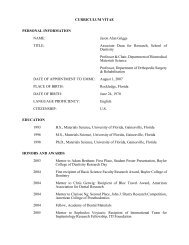Original crew members reminisce as AirCare celebrates 15 years
Original crew members reminisce as AirCare celebrates 15 years
Original crew members reminisce as AirCare celebrates 15 years
Create successful ePaper yourself
Turn your PDF publications into a flip-book with our unique Google optimized e-Paper software.
8<br />
CENTERVIEW<br />
EARLY HELLP by Jack Mazurak<br />
A recently rele<strong>as</strong>ed University of Mississippi Medical Center study of 190<br />
pregnant women with HELLP Syndrome, a severe form of preeclampsia, further<br />
underscores the effectiveness of a locally formulated treatment called the Mississippi<br />
Protocol.<br />
“What this paper shows is that by identifying mothers who are moving toward<br />
HELLP and starting the protocol early on – starting steroids and controlling systolic<br />
blood pressure – helps to speed the mother’s recovery. It slows and can stop the<br />
Co-authors on a study of UMMC patients with HEllP Syndrome are, from left,<br />
ob/gyn fellow Dr. Justin Brewer, clinical research <strong>as</strong>sistant Pam Blake and Dr. Jim Martin,<br />
professor of obstetrics and gynecology and the study’s principal investigator.<br />
dise<strong>as</strong>e progression,” said Dr. Jim Martin, professor of obstetrics-gynecology and the<br />
study’s principal investigator.<br />
HELLP Syndrome is an acronym for the symptoms defining it – hemolysis, or the<br />
breaking down of red blood cells, elevated liver enzymes and low blood platelet count.<br />
While it causes few maternal deaths in developed countries, it can disrupt renal function,<br />
cause liver hematom<strong>as</strong> or hemorrhages, strokes and cardiov<strong>as</strong>cular problems.<br />
OF the 190 wOMeN studied from 2000-07, Martin and his team saw no<br />
maternal deaths, strokes or hemorrhages develop. Only two women suffered cardiov<strong>as</strong>cular<br />
complications.<br />
Of 163 patients who were below cl<strong>as</strong>s 1 status in HELLP Syndrome when doctors<br />
began the protocol, only 39 women – 24 percent – progressed to cl<strong>as</strong>s 1. Only<br />
18.2 percent of cl<strong>as</strong>s 1 and 2.4 percent of the less-acute cl<strong>as</strong>s 2 patients subsequently<br />
developed major maternal morbidity.<br />
The journal “Hypertension in Pregnancy” rele<strong>as</strong>ed an online abstract of the<br />
study in January. Print publication is expected this spring.<br />
“This is the first study to show that using such a protocol, if initiated early enough<br />
in the dise<strong>as</strong>e process, can slow down dise<strong>as</strong>e and minimize excess morbidity,” said<br />
Martin, director of maternal-fetal medicine. “The protocol doesn’t change the fact that<br />
the patient came in with HELLP. It won’t reverse it, but it will slow or stop it.”<br />
Traditionally doctors give preeclamptic mothers corticosteroids, such <strong>as</strong> Decadron,<br />
on the baby’s behalf. Steroids speed fetal lung development and allow an earlier<br />
delivery. Once delivered, preeclampsia usually subsides.<br />
CEnTErVIEW | February 7, 2011<br />
Martin and his team developed the Mississippi Protocol throughout the<br />
1990s. When they realized the effect of steroids on the mother – slowing and<br />
sometimes stopping the advance of HELLP – they made it a key <strong>as</strong>pect of their<br />
protocol.<br />
the MIssIssIppI prOtOCOl is still considered experimental, not the<br />
standard of care but certainly within it, Martin said.<br />
“Not everybody in the profession uses it because there’s been no large, randomized<br />
controlled study that proves it effective,” he said. “Still,<br />
we’ve been down this treatment road so long now, with such<br />
good results, I wouldn’t want to expose those moms to anything<br />
but.”<br />
The National Heart, Lung and Blood Institute decided<br />
against funding such a study that Martin and his team proposed<br />
in the late 1990s.<br />
“A large randomized study would be a tremendous undertaking<br />
and quite expensive,” Martin said. “We had 26 centers<br />
across the country involved and an independent data-monitoring<br />
center and a proposed 1,500 patients.”<br />
The somewhat rare nature of HELLP and that it’s often misdiagnosed<br />
further complicates prospects for a nationwide study.<br />
UMMC sees 30-45 HELLP patients annually, more than average<br />
for hospitals because Mississippi’s population is the nation’s<br />
unhealthiest. And with UMMC’s expertise in preeclampsia and<br />
its standing <strong>as</strong> the state’s only academic health science center,<br />
many preeclamptic mothers get referred to the Medical Center<br />
from elsewhere in the state.<br />
the COMpleted study of 190 women w<strong>as</strong> funded by<br />
Department of Obstetrics and Gynecology revenue. Co-authors<br />
include Dr. Michelle Owens, Dr. Sharon Keiser, Dr. Marc<br />
Parrish, Dr. Kiran Tam Tam and Dr. Justin Brewer. Co-authors<br />
Julie Cushman and Pam Blake, clinical research coordinator,<br />
along with Warren May, professor in the Center of Biostatistics and Bioinformatics,<br />
<strong>as</strong>sisted with gathering and managing the study’s data.<br />
The next step, Martin said, and one which Owens is already working on, is<br />
figuring out just why the steroids work for the mothers.<br />
•<br />
•<br />
•<br />
•<br />
•<br />
•<br />
Study indicates Mississippi Protocol<br />
effective in treating preeclamptic women<br />
Dr. James Martin and his team developed the Mississippi Protocol, a<br />
treatment course for HELLP Syndrome, throughout the 1990s. Its<br />
precepts are:<br />
Early identification of preeclamptic women who may be developing<br />
HELLP Syndrome;<br />
Administer corticosteroids quickly if there’s epig<strong>as</strong>tric pain, eclampsia<br />
or rapid HELLP progression;<br />
If not, monitor platelet counts and lactic dehydrogen<strong>as</strong>e (LDH) and<br />
<strong>as</strong>partate aminotransfer<strong>as</strong>e (AST) levels;<br />
Monitor systolic blood pressure, treat with antihypertensive drugs<br />
if above 160; and<br />
Administer corticosteroids with decre<strong>as</strong>es in platelet count<br />
and LDH or incre<strong>as</strong>es in AST.









